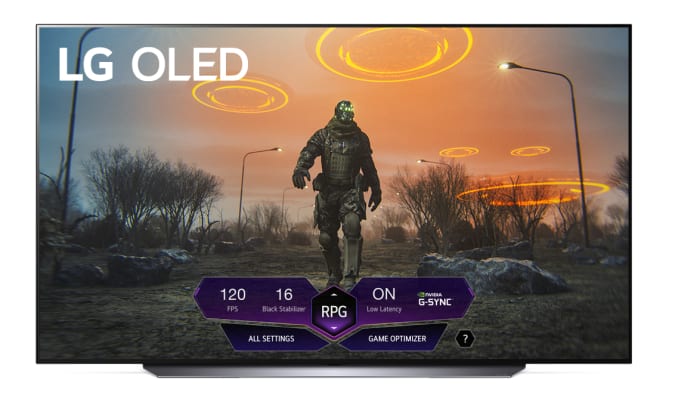It’s long been feared that the crazy complications of the latest HDMI 2.1 format coupled with the big forward leap in graphics quality being offered by the next generation of PCs and games consoles would cause serious compatibility issues. And unfortunately it seems that one of the most talked about next-gen combinations, Nvidia’s new RTX 30 graphics cards and LG’s 2019 and 2020 OLED TVs, has fallen at the first hurdle.
Owners of both LG 9 and X series OLEDs are reporting that the TVs aren’t handling the highest quality outputs properly from their new RTX 30 Series cards - even though, on paper at least, they should. In fact, LG has often talked up the gaming potential of its recent OLED TVs, as opened up by the high bandwidth support of the 48Gbps HDMIs on its 2019 9 series OLEDs, and the 40Gbps HDMIs on its 2020 X series OLEDs.
The two main problems being reported appear to be as follows. First, users of both the LG OLED 9 and X series are reporting a complete loss of picture (a black screen) when attempting to apply Nvidia’s G-Sync variable refresh rate technology at 120Hz frame rates. This occurs regardless of which bit depth or resolution you choose.

The LG OLEDCX is, like all LG's X series OLEDs, having issues with the latest Nvidia graphics cards.
Photo: LGThe second issue seems to be restricted to X series models, and finds the TVs reducing signals output in RGB/120Hz/4:4:4 to 4:2:2 chroma subsampling. This happens irrespective of whether you have G-Sync active or not, or which output resolution you have selected. And it results in notable image degradation - as shown in the examples I was kindly allowed to reproduce here by Twitter user Sixi82.
There’s evidence to suggest that the blacking out screen problem with G-Sync at 120Hz may not be limited to LG’s HDMI 2.1-equipped OLED TVs, and so could be an issue with the new Nvidia cards.

The results of the downsampling issue being experienced on LG's X Series (top row 60Hz, if you're ... [+]
Photo: Twitter user @Sixi82The second issue, though, only appears to impact X series OLED users, not other displays and monitors. This made me wonder if it has something to do with the X series using HDMI 2.1 ports with lower 40Gbps bandwidths than the 48Gbps ports found on the 9 OLED series. However, the 40Gbps ‘restriction’ should in theory only impact 12-bit video, yet it appears that the downsampling also takes place with 10- and even 8-bit source signals.
It’s worth pointing out that while the issues being reported here are certainly frustrating and look like another kick in the teeth for the (actually hugely important) early adopter market, most TVs from most other brands can’t even get close to delivering the level of HDMI 2.1-related gaming features that LG’s 9 and X series OLEDs can. So these (hopefully fixable) teething problems perhaps deserve to be seen in the context of worthy, forward-thinking ambition on LG’s part as it has been trying to think ahead without actually having finished products to cross-check its forward-thinking ambitions against.

The RTX 3080 is causing issues with LG TVs.
Photo: NvidiaThat doesn’t make the problems any less frustrating though, of course. Especially given the level of investment required to put together a cutting edge gaming system like those being discussed here. Plus you might have thought that LG and Nvidia would have been working closely together to be sure of compatibility long before the RTX 30s ever went on sale.
I’ve raised both of the issues discussed in this article with LG and will report back when they’ve had chance to look into them for themselves. Experience suggests that LG generally does respond to such queries and will eventually deliver a solution - if one is possible. So keep an eye on my Forbes channel or the Twitter account linked to at the end of this article for further updates.
The Link LonkSeptember 21, 2020 at 12:48AM
https://ift.tt/2ZSs3az
LG OLED TVs Having Issues With Latest Nvidia RTX 30 Graphics Cards - Forbes
https://ift.tt/3eaxdmA
LG

No comments:
Post a Comment